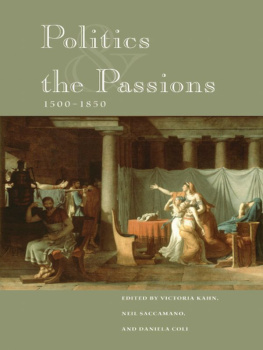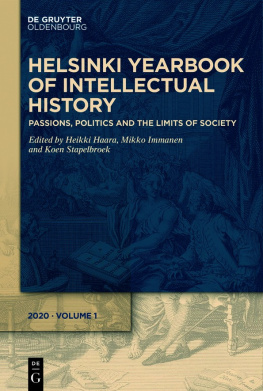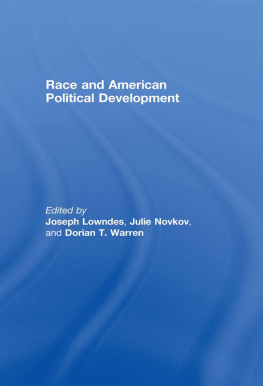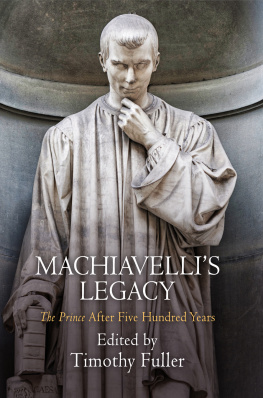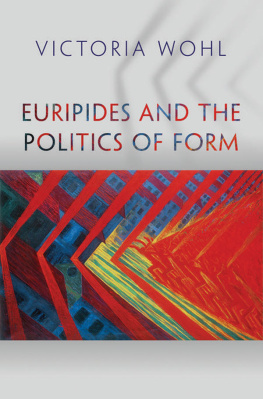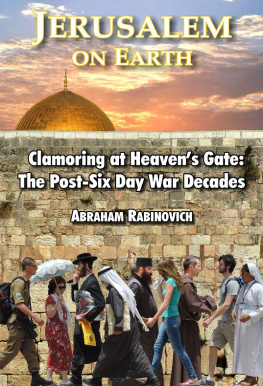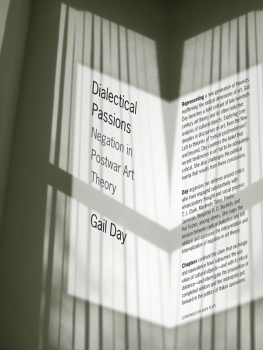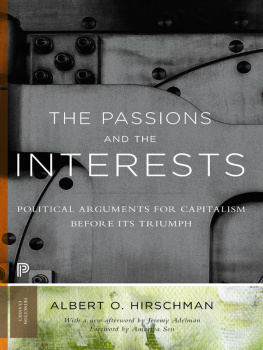Politics and the Passions, 15001850
Politics and the Passions, 15001850
Edited by Victoria Kahn,
Neil Saccamano, and Daniela Coli
PRINCETON UNIVERSITY PRESS
PRINCETON AND OXFORD
2006 by Princeton University Press
Published by Princeton University Press, 41 William Street,
Princeton, New Jersey 08540
In the United Kingdom: Princeton University Press,
3 Market Place, Woodstock, Oxfordshire OX20 1SY
All Rights Reserved
Library of Congress Cataloging-in-Publication Data
Politics and the passions, 15001850 / edited by Victoria Kahn,
Neil Saccamano, and Daniela Coli.
p. cm.
Includes bibliographical references and index.
eISBN: 978-1-40082-715-2
1. Political science. 2. Emotions. I. Kahn, Victoria Ann. II. Saccamano,
Neil, 1952 III. Coli, Daniela.
JA71.P6416 2006
320.01' 9dc22
2005028068
British Library Cataloging-in-Publication Data is available
This book has been composed in Sabon
Printed on acid-free paper. 
pup.princeton.edu
Printed in the United States of America
10 9 8 7 6 5 4 3 2 1
Contents
Introduction
Victoria Kahn and Neil Saccamano
IN RECENT YEARS there has been a renaissance of interest in the passions in interdisciplinary work in the humanities and social sciences. Scholars have directed their attention to the passions as vehicles of knowledge, as attributes of aesthetic experience, as labile affects or shifting currents that contribute to political upheaval or religious self-sacrifice. The reasons for this affective reorientation are multiple. We might think of it as a reaction to the linguistic turn or the deconstruction of the subject. We might instead think of it as the logical consequence of the focus on tropes and figures: themselves, as ancient rhetoricians tells us, the best means of representing the swerve of affect away from pure cognition, as well as the best means of stirring up the passions of the audience. We might think of the recourse to the passions as a consequence of the interest in the body and the body politic across a variety of disciplines. But there are also less academic reasons for the renewed interest in the passions. At a time when a rhetoric of terror is a central feature of our common political life, when political ideologies on the right and left vie to characterize themselves as compassionate, and when religious passions lead to shocking acts of violence, it is worth reexamining the history of Western reflection on politics and the passions.
This volume begins with the early modern period and concludes with Bentham. It focuses in particular on the new theories of human motivation, the new calculus of passion and interest, that emerged as a result of the social, political, and religious changes that facilitated the transition from feudalism to capitalism. It is arguable, of course, that the passions have always played an important role in Western reflection on politics. Beginning with Plato and Aristotle, philosophers, political theorists, and literary critics have devoted considerable attention to the role of the passions in shaping human knowledge and experience, both individual and collective. At the same time, however, scholars as diverse as Norbert Elias, Albert Hirschman, and Max Horkheimer have argued that the early modern period signals a shift in the conceptualization of the passions, specifically in relation to the political sphere. This volume proceeds from this argument. In the following pages, we briefly set out a framework for thinking about this conceptual shift that may provide a context for the essays that follow.
Elias famously argued that the centralization of political power at court produced a distinctive court society that required the sublimation of the passions and the cultivation of manners as the mark of the political elite. As the early modern state developed a monopoly of physical force, so the individual was no longer compelledor allowedto gain prestige on the battlefield. Instead, he began to be shaped by indirect forms of coercion, such as the norms of courtly society and increasing rationalization of economic life. At the same time, coercion was internalized: the nobilitys increasing dependence on the king or prince was accompanied by a transformation of human consciousness and libidinal make-up, according to which the individual constrained and controlled himself. For Elias, then, the modern Western notion of the civilized individual cannot be understood without tracing the process of state-formation in the sixteenth and seventeenth centuries.
Whereas Elias linked the sublimation of the passions to the civilizing process and the sociogenesis of absolutism, Max Horkheimer traced the revived interest in the passions to the skeptical and materialist strains of early modern philosophy and to bourgeois ideology. Skepticism about the persuasiveness of older normative discourses was accompanied by a new, naturalistic anthropology, involving the historical, political, and psychological analysis of the emotions. This ostensibly scientific concept of nature is, however, the ideological kernel of seventeenth-century discourses on the passions because the claim that the self-preservation of each thing is its law and standard corresponds to the social condition of the bourgeois individual. On one hand, the elevation of life itself to the highest good acknowledges the value of material embodiment and the concomitant passions. On the other hand, the recognition accorded material life in these discourses remains nondialectical and ideological in Horkheimers account because the passion of self-preservation is presented as the motion of an autonomous subject, not one who is conditioned by social and economic factors.
In his influential work on the passions and interests, Albert Hirschman also traced a historical shift in attitudes toward the passions to specifically political concerns. Like Horkheimer, Hirschman considered seventeenth-and eighteenth-century philosophical anthropology and ethics as developing in relation to political imperatives, but he differed about the ideological character of those imperatives, especially concerning the early modern critique of glory. The aristocratic passion for military glory, which was the traditional object and reward for action in the political realm, came under attack from early modern writers as contributing to civil and religious wars and thus as an unacceptable challenge to state power. The new theory of human nature required by a science of politics was characterized by a dynamics of countervailing passions. Against the heroic violence of glory, early modern writers opposed the dependable passion of acquisitiveness or greed. Against the desire for self-aggrandizement, they opposed the desire for self-preservation or fear of violent death. This reduction of human nature to its basest passions or interests, and of society to self-interested individuals who bind themselves through contracts, then set the stage for reconstituting the state from the ground up. It also gave rise to a new understanding of the relationship between the public and private spheres, and a new, positive evaluation of everyday life. Yet historically, Hirschman argued, this denunciation of the heroic ideal was nowhere associated with the advocacy of a new bourgeois ethos. The critique of glory marshaled a scientific, positive approach to politics that initially served to counsel princes in the practice of governing and that only later addressed the conduct of individual subjects, extending scientific discourse from the nature of the state to human nature (13).
Both in its emphasis on mere life and its representation of government as artificial (contractual or conventional), early modern political theory represented a radical departure from classical antiquity. In the political culture of ancient Greece, the life concerned only with preservation and reproductionwith the bodywas traditionally the life of women and slaves who were excluded from political participation and relegated to the management of the patriarchal household, consigned to purely economic labor and devoted to bare life alone. The inglorious life was private in the sense of privative, enslaved to the necessity of reproducing life itself as the mere condition of political freedom. The equality of free men in a political sense presupposed the inequality of those in the household who were concerned with economics. For a citizen of the polis, to live the good life meant to be free from the demands of mere life, and to be worthy of glory meant to master mere life and be willing to risk death for the polis. By contrast, early modern political theory appeals to the inglorious passions of the private individual in an effort to establish a civil society in which, as Hannah Arendt put it, the fact of mutual dependence for the sake of life and nothing else assumes public significance and where the activities connected with sheer survival are permitted to appear in public. For modernity, society is that for which the inglorious life of the ancient Greek householdeconomicsbecomes a matter of public concern. And the reason of the state, in this modern conception, is the protection and preservation of the life of its citizensa general collective management of economic transactions whose political form is the nation (28). In the classical conception of politics, the category of political economy would have been idiotic or senseless because it is a contradiction in terms until the modern period.
Next page
